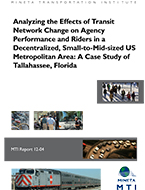- 408-924-7560
- mineta-institute@sjsu.edu
- Donate
Analyzing the Effects of Transit Network Change on Agency Performance and Riders in a Decentralized, Small-to-Mid-sized US Metropolitan Area: A Case Study of Tallahassee, Florida
On July 11, 2011, StarMetro, the local public transit agency in Tallahassee, Florida, restructured its entire bus network from a downtown-focused radial system to a decentralized, grid-like system that local officials and agency leaders believed would better serve the dispersed local pattern of population and employment. The new, decentralized network is based on radial routes serving the major arterial roads and new crosstown routes linking the outer parts of the city, where population and employment is growing. Local officials and agency staff hoped the change would increase transit’s attractiveness and usefulness to the community.
One year after the service restructuring, overall performance results are similar to those experienced in other cities that have implemented major service changes. Overall ridership and productivity are lower than before the service restructuring, due to the short time frame for rider adjustments and longer-than-anticipated headways, but new ridership has appeared in previously un-served or under-served corridors and neighborhoods. The service restructuring resulted in longer walks to bus stops, due to the removal of stops from many neighborhoods and their relocation to major roads, but overall transit travel times are shorter due to more direct routing. No particular neighborhoods or community groups disproportionately benefited from or were harmed by the change.
The service restructuring was supported by some segments of the community who viewed the older system as ill-suited to the increasingly decentralized community, while it was opposed by other community stakeholders who worried about the loss of service in some neighborhoods and issues of access and safety, particularly affecting elderly and disabled riders, at new stop locations. StarMetro’s extensive public outreach efforts and ongoing service adjustments have reduced the intensity of the opposition to the service restructuring over time, although some segments of the community continue to voice their concerns about the effects of the change on transit-dependent, disabled, and elderly riders.
JEFFREY BROWN, PhD
Jeffrey Brown is Associate Professor of Urban and Regional Planning at Florida State University. He received his PhD at University of California, Los Angeles. His research examines the role of public transportation in decentralized environments, the relationship between finance and transportation planning, and the history of transportation planning.
TUNA BATUHAN
Tuna Batuhan is a doctoral candidate at Florida State University. His research interests include the effects of mega-events on the transportation planning processes and institutions in host communities.
TORSHA BHATTACHARYA
Torsha Bhattacharya is a doctoral candidate at Florida State University. Her research interests include transportation systems, the relationship between transportation and land use, and equity in transportation. She is also interested in research geared towards improving accessibility for disadvantaged groups.
MICHAL JAROSZYNSKI
Michal Jaroszynski is a doctoral candidate at Florida State University. His research interests include the economic aspects of public transportation, such as assessing costs and benefits or finding the methods of improving its efficiency and productivity. He is also interested in analyzing policies related to public transit service planning, especially rail and multimodal transit systems.
-
Contact Us
San José State University One Washington Square, San Jose, CA 95192 Phone: 408-924-7560 Email: mineta-institute@sjsu.edu






